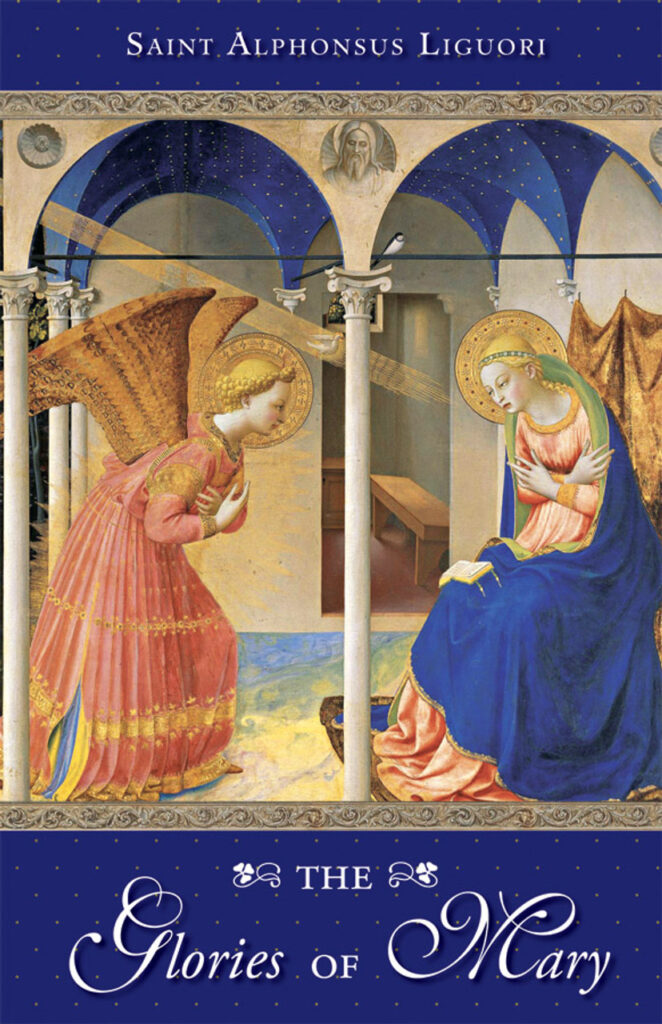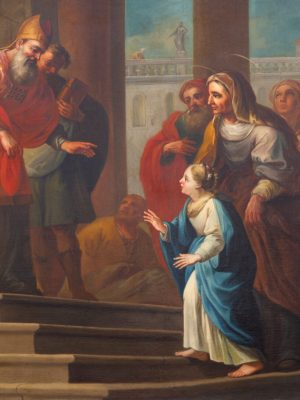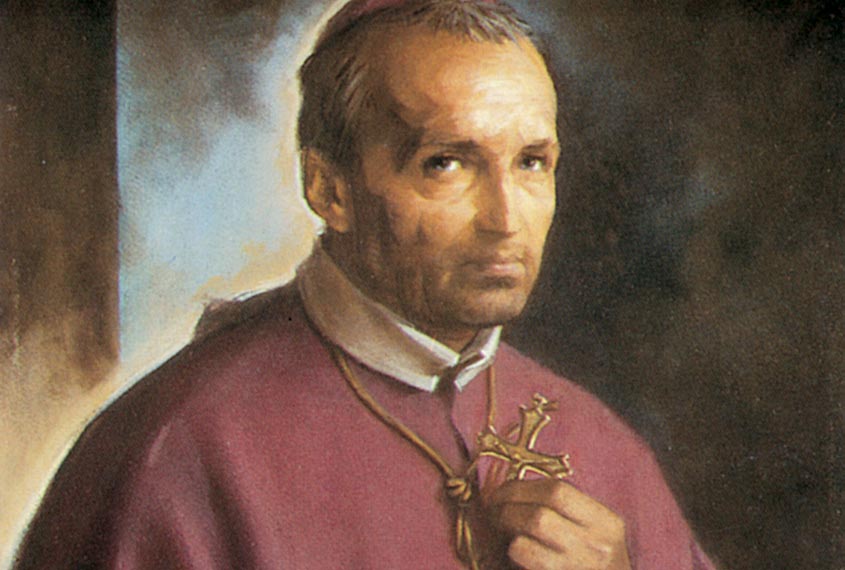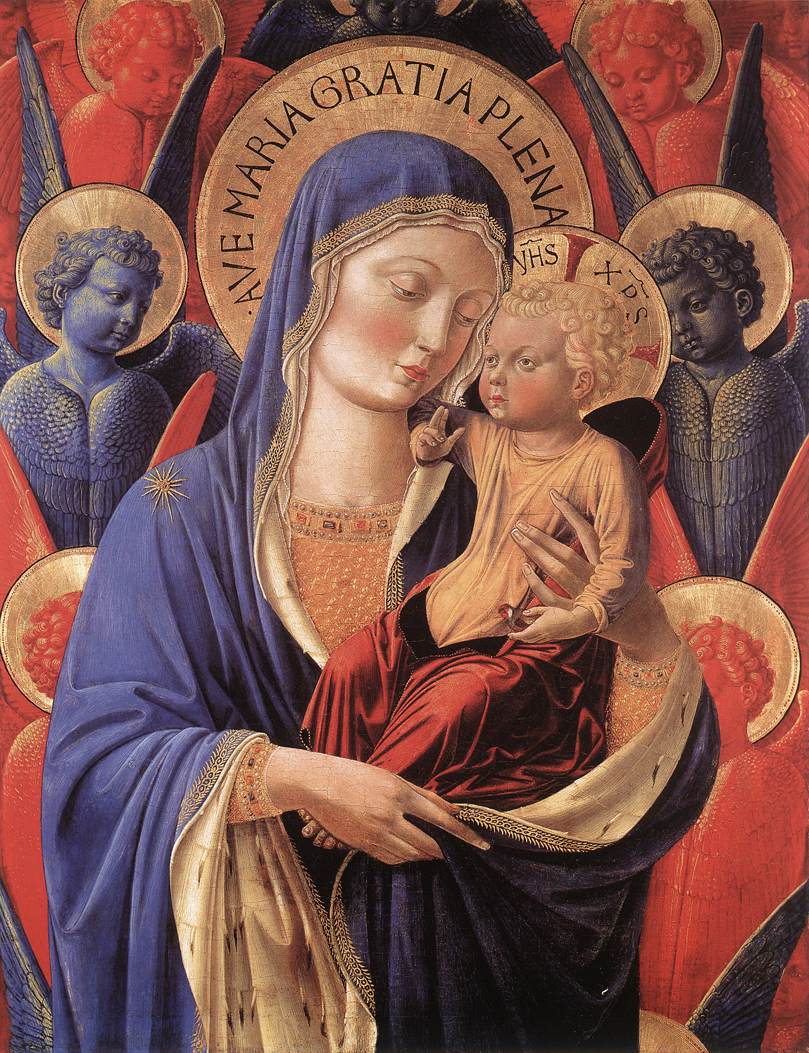The offering that Mary made of herself to God was prompt without delay, and entire without reserve
There never was, and never will be, an offering on the part of a pure creature greater or more perfect than that which Mary made to God when, at the age of three years, she presented herself in the temple to offer Him, not aromatical spices, nor calves, nor gold, but her entire self, consecrating herself as a perpetual victim in His honour. She well understood the voice of God, calling her to devote herself entirely to His love, when He said, “Arise, make haste, my love, my dove, my beautiful one, and come!”
Therefore her Lord willed that from that time she should forget her country, and all, to think only of loving and pleasing Him: “Hearken, O daughter, and see, and incline thine ear; and forget thy people, and thy father’s house.” She with promptitude and at once obeyed the divine call. Let us, then, consider how acceptable was this offering which Mary made of herself to God; for it was prompt and entire. Hence the two points for our consideration are, first, Mary’s offering was prompt and without delay; secondly, it was entire and without reserve.
First point.—Mary’s offering was prompt. From the first moment that this heavenly child was sanctified in her mother’s womb, which was in the instant of her Immaculate Conception, she received the perfect use of reason, that she might begin to merit. This is in accordance with the general opinion of theologians, and with that of Father Suarez in particular, who says, that as the most perfect way in which God sanctifies a soul is by its own merit, as Saint Thomas also teaches, it is thus we must believe that the Blessed Virgin was sanctified: ‘To be sanctified by one’s own act is the more perfect way. Therefore it is to be believed that the Blessed Virgin was thus sanctified.’ And if this privilege was granted to the angels, and to Adam, as the angelic Doctor says, much more ought we to believe that it was granted to the Divine Mother, on whom, certainly, we must suppose that God, having condescended to make her His Mother, also conferred greater gifts than on all other creatures.
‘From her,’ says the same holy Doctor, ‘He received His human nature, and therefore she must have obtained a greater plenitude of grace from Christ than all others.’ ‘For being a mother,’ Father Suarez says, ‘she has a sort of special right to all the gifts of her Son;’ and as, on account of the hypostatic union, it was right that Jesus should receive the plenitude of all graces, so, on account of the divine maternity, it was becoming that Jesus should confer, as a natural debt, greater graces on Mary than He granted to all other Saints and angels.
Thus, from the beginning of her life, Mary knew God, and knew Him so that ‘no tongue’ (as the angel declared to Saint Bridget) ‘will ever express how clearly this Blessed Virgin understood His greatness in that very first moment of her existence.’ And thus enlightened, she instantly offered her entire self to her Lord, dedicating herself, without reserve, to His love and glory. ‘Immediately,’ the angel went on to say, ‘our Queen determined to sacrifice her will to God, and to give Him all her love for the whole of her life. No one can understand how entire was the subjection in which she then placed her will, and how fully she was determined to do all according to His pleasure.’
But the Immaculate Child, afterwards understanding that her holy parents, Joachim and Anne, had promised God, even by vow, as many authors relate, that if He granted them issue, they would consecrate it to His service in the temple; as it was, moreover, an ancient custom amongst the Jews to take their daughters to the temple, and there to leave them for their education (for which purpose there were cells contiguous), as it is recorded by Baronius, Nicephorus, Cedrenus, and Suarez, with Josephus, the Jewish historian, and also on the authority of Saint John Damascen, Saint George of Nicomedia, Saint Anselm, and Saint Ambrose, and, as we may easily gather from the Second Book of Machabees, where, speaking of Heliodorus, who besieged the temple, that he might gain possession of the treasure there deposited, says, “Because the place was like to come into contempt . . . and the virgins also that were shut up came forth, some to Onias.”
Mary hearing this, I say, having scarcely attained the age of three years, as Saint Germanus and Saint Epiphanius attest—the latter of whom says, ‘In her third year she was brought to the temple’—an age at which children are the most desirous and stand in the greatest need of their parents’ care, she desired to offer and solemnly to consecrate herself to God, by presenting herself in the temple. Hence, of her own accord, she requested her parents, with earnestness, to take her there, that they might thus accomplish their promise. And her holy mother, says Saint Gregory of Nyssa, ‘did not Iong delay leading her to the temple, and offering her to God.’
This article is taken from a chapter in The Glories of Mary by St. Alphonsus Liguori which is available from TAN Books.









